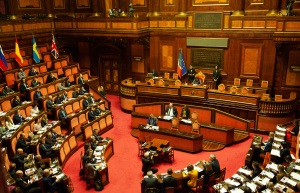At a ceremony held at the European Investment Bank in Luxembourg, Paulette Lenert, Luxembourg Minister for Cooperation and Humanitarian Affairs, presented the 10th European Microfinance Award to APA Insurance Ltd of Kenya.
Since 2006, Luxembourg Directorate for Development Cooperation and Humanitarian Affairs, the European Microfinance Platform and the Inclusive Finance Network Luxembourg have been awarding a €100,000 prize to the winner and, starting two years ago, €10,000 to the two finalists. This year’s winner, APA Insurance Ltd, is a Kenyan insurance company that provides indexbased agriculture insurance to cover yields and livestock, thus providing farmers with a safety net. Index-based insurance is an innovative approach to insurance whereby payments are linked to easily measured environmental conditions known as an “index” (e.g. the level of rainfall, yields or vegetation levels as measured by satellite) directly connected to the loss of agricultural output. When the index exceeds a particular threshold, farmers automatically receive compensation. In Kenya, where over 75% of farmers are smallholders, who are especially vulnerable to the economic impacts of climate change, APA Insurance Ltd currently covers more than 350,000 families whose livelihoods are largely based on agriculture.
While increasingly unpredictable weather conditions and climate change threaten the already precarious situations in developing countries, Minister Lenert, who chaired the High Jury of the European Microfinance Award, noted that: “This year’s Award illustrates that inclusive finance has an essential role to play in strengthening the resilience of vulnerable communities to the effects of climate change, which threaten the livelihoods of disadvantaged communities, especially those relying on agriculture, forestry or fisheries.”
Dr Hoyer, President of the European Investment Bank, emphasised that “Climate Change is an existential threat for many nations and communities. How we combat and adapt will shape our future. The three finalists of the European Microfinance Award, and APA Insurance Ltd in particular, are delivering innovative solutions for the financial sector to support vulnerable communities in tackling the effects of climate change.”
European Microfinance Award
The only one of its kind in the world, the European Microfinance Award was launched in October 2005 by the Directorate for Development Cooperation and Humanitarian Affairs of the Luxembourg Ministry of Foreign and European Affairs to nurture innovative microfinance initiatives. It is jointly organised by the Ministry of Foreign and European Affairs, the European Microfinance Platform (e-MFP) and the Inclusive Finance Network Luxembourg (InFiNe.lu) with the support of the European Investment bank (EIB).
http://www.european–microfinance–award.com/
Contacts
MAEE: Laura Valli Laura.Valli@mae.etat.lu +352 247 82347
InFiNe.lu: Catherine Van Ouytsel catherine.vanouytsel@infine.lu +352 28 37 15 09
e-MFP: Niamh Watters nwatters@e-mfp.eu +352 26 27 13 82


